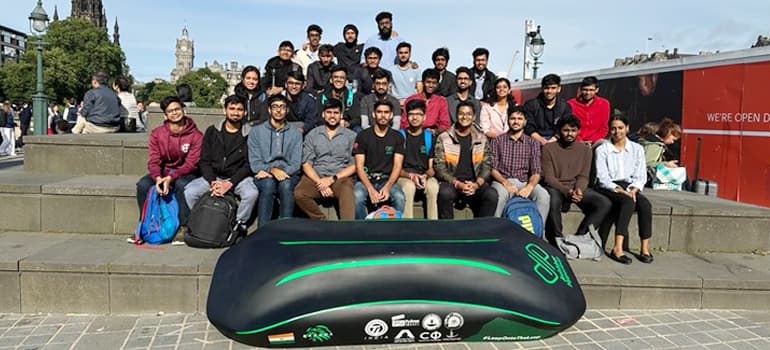
Revolutionizing Transport: Hyperloop at IIT Madras
The Hyperloop is a representation of futuristic innovation in the race to develop next-generation transportation. IIT Madras is leading the charge among the organizations working to make this idea a reality and is putting India's name on the map of high-speed transportation worldwide.
What is the Hyperloop?
Basically, pods are propelled through low-pressure tubes at nearly supersonic speeds by the Hyperloop, a high-speed, environmentally friendly transit system. This fifth form of transportation, which was first envisioned by Elon Musk, promises to significantly cut travel times while still being environmentally friendly and energy-efficient.
Leading India's Hyperloop Vision
Avishkar Hyperloop, India's first and only team to place among the top international competitors in the SpaceX Hyperloop Pod Competition, is based at IIT Madras. This student-led team was established in 2017 and is developing scalable Hyperloop systems that are customized according to Indian needs.
Milestones Reached
- Ranked among the top 21 teams globally in the SpaceX competition.
- Created India’s first homegrown Hyperloop prototype.
- Secured research grants and industry partnerships for full-scale models.
- Opened India’s first Hyperloop Test Track at the Discovery Campus in Chennai.
New Technologies and Ideas
The project exemplifies a multidisciplinary engineering effort aligned with the "Make in India" initiative. Key innovations include:
- Magnetic levitation (MagLev) for frictionless travel.
- Vacuum tubes to reduce air resistance.
- Clean propulsion using linear induction motors.
- Smart control systems for safety and automation.
Why Hyperloop is Good for India?
-
Drastically Reduced Travel Time
Enables journeys like Chennai to Bengaluru in 30 minutes, transforming business, tourism, and commuting. -
Environmentally Friendly and Sustainable
Operates on renewable energy with zero direct emissions, aligning with India's carbon neutrality goals. -
Decongesting Cities
Encourages development of smart satellite cities by enabling long-distance commuting. -
Job Creation and Skill Development
Generates thousands of high-skill jobs and enhances India’s R&D ecosystem from design to deployment.
Challenges Faced
Despite its promise, the journey hasn’t been easy. Major challenges include:
-
Infrastructure and Land Acquisition
Laying vacuum tubes over vast distances involves significant land and policy hurdles. -
High Initial Investment
Requires major capital outlay, necessitating collaboration across government, industry, and academia. -
Regulatory and Safety Standards
India currently lacks dedicated transport regulations for Hyperloop, needing new policy frameworks. -
Technical Barriers
Challenges include maintaining low-pressure environments, reliable levitation, and effective emergency systems.
How It Can Bring a Revolution in India
Hyperloop offers transformative potential beyond just fast transport:
-
Boosting Economic Corridors
Enhances productivity and unlocks underdeveloped regions by facilitating rapid movement. -
Setting Global Standards
Positions India as a global leader in Hyperloop technology and innovation. -
Igniting Scientific Temper
Promotes interdisciplinary research and inspires the next generation of engineers. -
Global Collaboration
Strengthens India’s role in global innovation through collaborative research and development.
The Road Ahead
With full-scale tests planned and policy discussions ongoing, riding a Hyperloop pod in India by 2030 is a tangible goal. IIT Madras continues to lead this vision, pushing India closer to a transportation revolution.
Final Thoughts
Hyperloop at IIT Madras isn’t just a student project—it’s a national leap into the future. By combining academic excellence with visionary engineering, it showcases what India’s youth can achieve when imagination meets execution.
